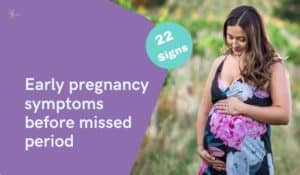-
Author: Khushboo Kirale
- >> Post Created: June 22, 2021
- >> Last Updated: November 22, 2024
Medically Reviewed by: Dr. Veena Shinde (M.D, D.G.O, PG – Assisted Reproductive Technology (ART) from Warick, UK) Mumbai, India

When does morning sickness start: Table of contents
Pregnancy is a big change in a woman’s life. As soon as you conceive, there are many hormonal changes that go about within the body to prep up for becoming a mother.
The initial few weeks of pregnancy are filled with a lot of excitement and a lot of changes—Emotional + Physical changes. Understanding these signs can help you decipher whether you are pregnant or not.
One such early sign of pregnancy is morning sickness. Morning sickness happens to almost all pregnant women, some get early, some late and only 8-10% of pregnant women do not get it at all. Most women have a lot of queries about morning sickness—When does morning sickness start?/ How soon does morning sickness start in pregnancy? What are the symptoms? How to manage morning sickness? When does morning sickness end? and so on…
This article will definitely help you understand everything related to morning sickness during pregnancy; when does morning sickness start?/how soon does morning sickness start?; its common causes; triggers and more…
What is morning sickness?
Morning sickness is nothing but a feeling of nausea that most women experience during their pregnancy. It’s a myth that morning sickness only happens in the morning. Actually, it can happen all throughout the day, but generally the intensity lowers as the day progresses.
Morning sickness can include both nausea and vomiting or it can just be nausea without any vomiting. Most women experience morning sickness predominantly in the first trimester of pregnancy.
You can always say you have nausea and vomiting, but most people have used morning sickness as the preferred term in day-to-day conversation during pregnancy. You may think why is it specifically named morning sickness and not night sickness or afternoon sickness?
This is because many women have reported that they felt more severe symptoms in the morning; therefore, it came to be called as morning sickness even though it can happen any time during the day.
Pregnant women throwing up first thing in the morning has become a stereotype that has been portrayed in many movies and sitcoms, but many women have a variety symptoms. Some women throw up quite frequently, others feel nauseated throughout the day, and some others feel nausea only when they are exposed to certain smells and food products.
Nausea during pregnancy is generally co-related to the estrogen levels, vulnerability to certain types of smells, and lower blood sugar counts. Read on to understand specific triggers and understand the various causes that lead to morning sickness.
Read this next
What causes morning sickness? Factors contributing to morning sickness
Even though the exact cause of morning sickness has not yet been determined, but the following factors can be among the main causes:
- Estrogen levels—Experts believe that morning sickness may be partly caused due to an exponential increase in the levels of estrogen, which can be 100 times higher during pregnancy as compared to women who are not pregnant. However, there is no conclusive evidence to show difference in estrogen levels between pregnant women with or without nausea or morning sickness.
- Progesterone levels—During pregnancy, progesterone levels rise as well. The higher levels help relax the uterus muscles to avoid early birth. However, it may also relax the intestines and stomach, causing excess production of stomach acids and gastroesophageal reflux disease (GERD).
- Human chorionic gonadotropin (hCG)—It is produced initially by the growing embryo after conception and then by the placenta. A few experts have suggested there is a co-relation between hCG levels and morning sickness/nausea.
- Hypoglycemia—Also known as low blood sugar, is caused due to the placenta draining the energy from the body of the mother. However, this is yet to be scientifically proven.
- Sense of smell—Pregnancy may cause a sudden increase in sensitivity to odors, which may trigger nausea and vomiting when exposed to certain smells.
These other factors can further worsen morning sickness:
- Excessive fatigue
- Having twins or triplets
- Stress—emotional or physical
- Traveling frequently
- Urinary tract infection
- Smelling certain foods or scents
- Eating (especially spicy foods)
- Heat and severe salivation
Like every pregnancy is different, similarly for every woman what triggers morning sickness during pregnancy is different. I had developed a complete aversion to eggs, even the smell of eggs used to make me puke.
If you feel concerned at any stage about your nausea or vomiting or even no nausea/no morning sickness, then please consult your doctor.
When does morning sickness start?
To answer the question—‘When does morning sickness start’—generally pregnant women experience morning sickness somewhere around the 6th week of pregnancy and as early as from 2nd week after missed period.
Now, ‘How soon does morning sickness start’ — When answering this question, you have to bear in mind that the symptoms of morning sickness—nausea and vomiting can appear progressively or just appear overnight. The intensity of morning sickness symptoms spreads across a range — right from a mild aversion to certain smells or foods to persistent nausea and vomiting in severe cases.
Simple steps to get relief from nausea and prevent morning sickness
In addition to your doctor’s guidance, making a few dietary changes coupled with plenty of rest usually helps in preventing morning sickness.
Even when suffering with severe morning sickness – Hyperemesis Gravidarum (HG), doctor not only suggests medicines but also lifestyle changes – especially they suggest going on a hyperemesis gravidarum diet.
Taking the following steps may help prevent/minimize nausea and morning sickness:
- Drink plenty of water
- Make sure you drink water before and after all meals
- Keep your home or workplace well ventilated—this will help eliminate scents that trigger nausea
- Take regular naps
- Rather than eating two or three full meals a day, eat smaller portions every few hours
- Ideally, take your vitamins at night
- Spicy food should be avoided
- Stay away from fatty and fast food
- Don’t smoke cigarettes
- Ensure your diet is rich in proteins and healthy carbs
- Chew ginger candies; you can also sip ginger tea
- Try alternative therapies like acupuncture or acupressure, but ensure you go to a licensed practitioner only
- Keep a few crackers near your bedside and eat at least one cracker as soon as you wake up in the morning
- Strong smells/fragrances should be avoided completely
- Rather than takeout, try and eat meals that can be easily prepared at home like sandwiches, salads, or fruit smoothies
- Drinking lemonade or even sniffing lemon juice helps
- Keep your head and yourself cool, because during pregnancy you will feel hot—a little more than your normal body temperature
- Keep yourself active by doing some exercise, prenatal yoga, swimming, etc., but consult your doctor before you start any form of physical activity
- Take rest as much as possible
If you continue to get morning sickness beyond 3–4 months and none of the above mentioned solutions worked, then please consult your doctor. They may prescribe you Vitamin B6 supplements or even anti-nausea medicines which are safe during pregnancy.
Additionally, please do not take any medications or alternative remedies without speaking with your doctor.
When to seek help?
Absolutely severe morning sickness in pregnancy is known as Hyperemesis Gravidarum (HG) and it needs to be treated medically so that you can have a healthy pregnancy.
The causes of HG and the reasons why some women are more susceptible to HG than others are still unknown. Some experts believe that there is a link between HG and the changing hormone levels during pregnancy, but nothing is certain at this point.
The exact reason for HG is still unknown, but various metabolic and neuromuscular factors have been believed to contribute to HG. Consequently, the treatment for HG can become difficult, as the full effects of the potential available treatments on the growing fetus is also unknown.
Anything in excess is not good. Similarly if you feel that morning sickness has become too severe, then please take medication from your doctor. HG can develop in approx. 1–2% of pregnancies.
Consult your doctor immediately if you notice any of these extreme symptoms:
- If the morning sickness symptoms get too severe
- If you are losing weight too quickly
- If you are unable to eat and drink anything
- If vomiting and nausea is accompanied by fever, abdominal pains, or headaches
- If your overall fluid consumption reduces radically
- If you feel dizziness while standing
- If the urine gets dark yellowish in color
- If you feel your heartbeats have increased
- If you notice blood in the vomit
You will need medical care if your condition deteriorates and you start feeling too dehydrated and sick.
For most pregnant women, morning sickness improves post the 12th week of pregnancy. Unfortunately, for a few others, morning sickness symptoms can remain throughout their pregnancy.
Key Takeaway
We know that morning sickness during pregnancy can become a hindrance in your day-to-day life, and having morning sickness does not mean there is anything wrong with you and neither does it mean that if you don’t get it during your first trimester then your pregnancy is not progressing well. So ladies stop fretting over the question – ‘When does morning sickness start ?’. It just means that your body is preparing for your growing fetus by secreting the right hormones. It is completely normal and nothing to worry about in most cases.
Again, contrary to the name, morning sickness can occur any time of the day. Nighttime morning sickness or nausea during night has been observed among most pregnant women.
Morning sickness can become a major problem for some women, but for many others it just lasts for a few weeks and is not triggered thereafter. Most women only notice morning sickness between 6 weeks and 14 weeks, after which the occurrence of morning sickness is greatly reduced.
For most women the condition is quite manageable, but if you find the symptoms a lot more alarming, you can always try some of the prevention and controlling measures mentioned in our article. Most women have reported relief after trying a few of these prevention options.
But some women have a severe case of morning sickness which is called hyperemesis gravidarum that will require medical attention. Contact your doctor immediately if you feel the morning sickness is uncontrollable and continues to be severe even after 14 to 15 weeks of pregnancy.
We hope our article has answered your your main question on – ‘When does morning sickness start ?’ along with a few other FAQs like what are its causes, what are the symptoms, etc. Try our tips for controlling and preventing morning sickness, they help in most cases.
Happy Pregnancy!!!







Superb! very helpful article for the first timers like me.
Thanks